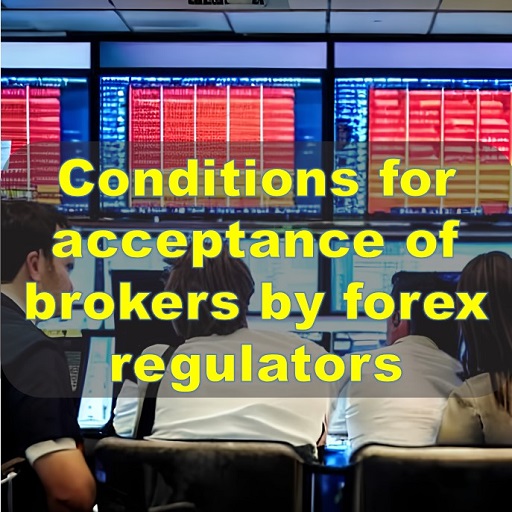The conditions for acceptance of brokers by forex regulators may vary depending on the specific regulatory body and jurisdiction. However, there are some common criteria that regulators typically consider when evaluating brokers for acceptance. Here are some key factors:
Compliance with Licensing Requirements
Forex brokers must meet the licensing requirements set by the regulatory authority in their jurisdiction. This may include submitting detailed applications, providing financial statements, disclosing ownership and management information, and demonstrating compliance with anti-money laundering (AML) and know-your-customer (KYC) regulations.
Financial Stability
Regulators often assess the financial stability and capital adequacy of forex brokers. Brokers may be required to maintain a minimum level of capital to ensure they can cover operational expenses and client withdrawals. This requirement is designed to protect traders’ funds and ensure the broker’s ability to fulfill its obligations.
Segregation of Client Funds
Regulators usually require brokers to keep client funds separate from their own operational funds. This segregation of client funds helps safeguard traders’ money and ensures it can be easily returned to clients in case of insolvency or bankruptcy.
Transparent Pricing and Fair Trading Practices
Forex brokers must operate with transparency and fairness. Regulators may scrutinize brokers’ pricing models, execution practices, and order handling procedures to ensure they are providing a level playing field for traders. This includes monitoring for conflicts of interest and ensuring that brokers do not engage in unfair practices that disadvantage their clients.
Risk Management and Investor Protection
Regulators prioritize the protection of investors and often require brokers to have robust risk management practices in place. This may involve implementing measures such as margin requirements, leverage limits, negative balance protection, and risk disclosure to educate traders about the risks involved in forex trading.
Operational Standards and Infrastructure
Regulators assess brokers’ operational standards and infrastructure to ensure they have appropriate systems and procedures in place to handle client orders, maintain records, and resolve disputes. This includes having secure trading platforms, reliable trade execution, and effective customer support.
Compliance with Regulatory Guidelines
Forex brokers must adhere to the regulatory guidelines and codes of conduct set by the relevant regulatory authority. This includes complying with reporting requirements, cooperating with regulatory audits and inspections, and promptly addressing any regulatory concerns or inquiries.
Fit and Proper Standards
Regulators typically assess the fitness and propriety of the individuals involved in the brokerage firm, including the directors, executives, and key personnel. They may evaluate their qualifications, experience, reputation, and whether they have been involved in any financial misconduct or regulatory violations in the past.
Compliance and Reporting Obligations
Forex brokers are required to comply with various regulatory obligations, such as submitting regular reports, maintaining adequate records, and conducting audits. Regulators will assess whether the broker has the necessary systems and processes in place to fulfill these obligations effectively.
Advertising and Marketing Practices
Regulators may review the broker’s advertising and marketing materials to ensure they are fair, clear, and not misleading. Brokers must provide accurate information to clients, disclose risks associated with forex trading, and refrain from making false or exaggerated claims about potential profits.
Complaints Handling and Dispute Resolution
Regulators may examine how brokers handle customer complaints and disputes. They expect brokers to have proper procedures in place for addressing client grievances, ensuring prompt resolution, and offering appropriate compensation when necessary.
Continuous Compliance Monitoring
Regulatory bodies often engage in ongoing monitoring and supervision of brokers to ensure continued compliance with regulatory requirements. They may conduct periodic audits, inspections, and reviews to assess the broker’s adherence to the regulations and take necessary actions in case of non-compliance.
Membership in Investor Compensation Schemes
Some jurisdictions require brokers to be members of investor compensation schemes or similar programs that provide protection to clients in case of broker insolvency. This requirement ensures that traders have a recourse option to recover their funds in case the broker faces financial difficulties.
Anti-Fraud Measures
Regulators are keen on protecting investors from fraudulent activities. They may scrutinize brokers’ systems and processes for detecting and preventing fraud, including measures to identify and report suspicious transactions, implement robust cybersecurity protocols, and safeguard client information.
Compliance with International Standards
In some cases, regulators may require brokers to adhere to international standards and best practices established by organizations such as the International Organization of Securities Commissions (IOSCO). Compliance with these standards ensures that brokers follow global guidelines for market integrity, investor protection, and risk management.
Professional Indemnity Insurance
Regulators may expect brokers to maintain professional indemnity insurance coverage. This insurance protects brokers and their clients in case of negligence, errors, or omissions by the broker or their employees, providing an additional layer of financial protection.
Business Conduct and Ethics
Regulators may evaluate brokers’ adherence to ethical standards and responsible business conduct. This includes avoiding conflicts of interest, ensuring fair treatment of clients, promoting transparency and disclosure, and prohibiting abusive or manipulative practices.
Compliance Training and Education
Regulators may assess the broker’s training programs and educational resources provided to their staff and clients. Offering comprehensive training and educational materials demonstrates a commitment to empowering traders with knowledge and promoting responsible trading practices.
International Sanctions and Compliance
Regulators may verify that brokers comply with international sanctions and embargoes imposed by regulatory bodies or international organizations. Brokers must not engage in transactions with individuals, entities, or countries subject to such sanctions.
Cross-Border Operations
If a broker intends to operate across multiple jurisdictions, regulators may evaluate their ability to comply with regulations in each jurisdiction, including obtaining necessary licenses or permissions, adhering to local laws, and establishing appropriate risk management measures for cross-border activities.
Record Keeping and Audit Trail
Regulators may require brokers to maintain comprehensive records of their activities, including client transactions, communications, and trade executions. This allows regulators to conduct audits and investigations effectively and ensures transparency and accountability.
Compliance with Trading Rules and Market Integrity
Brokers must adhere to trading rules and regulations established by the regulatory authority to ensure fair and orderly markets. Regulators may evaluate the broker’s compliance with these rules, such as order handling procedures, trade reporting obligations, and market manipulation prevention measures.
Supervision and Oversight
Regulators may assess the internal controls, risk management frameworks, and governance structures of brokers. They expect brokers to have adequate supervisory mechanisms in place to monitor trading activities, identify and mitigate risks, and ensure compliance with regulatory requirements.
Technology Infrastructure and Security
Regulators may review the broker’s technology infrastructure, including trading platforms, data security measures, and disaster recovery plans. Brokers must have robust systems to handle trading volumes, protect client data, prevent unauthorized access, and ensure the smooth functioning of their operations.
Business Continuity Planning
Regulators expect brokers to have robust business continuity plans in place to ensure the continuity of their operations in case of unforeseen events, such as natural disasters, cyberattacks, or system failures. This includes measures to minimize disruptions, protect client funds and data, and communicate effectively with clients during such incidents.
Regulatory Reporting and Compliance Monitoring
Brokers are typically required to submit regular reports and disclosures to the regulatory authority. Regulators may assess the accuracy, timeliness, and completeness of these reports to ensure compliance with reporting requirements and monitor the broker’s overall compliance with regulations.
Cooperation with Regulatory Authorities
Regulators expect brokers to cooperate fully with their regulatory authority, provide requested information and documents promptly, and respond to regulatory inquiries and inspections. Non-cooperation or obstruction may negatively impact the broker’s acceptance and ongoing relationship with the regulator.
Outsourcing and Third-Party Relationships
Regulators may assess how brokers manage their outsourcing arrangements and relationships with third-party service providers. Brokers should have proper due diligence processes in place to evaluate the suitability and reliability of these partners, as well as effective oversight mechanisms to ensure compliance with regulatory requirements.
Conflict of Interest Management
Regulators may scrutinize how brokers manage conflicts of interest between themselves, their employees, and their clients. Brokers should have policies and procedures in place to identify and address potential conflicts, disclose relevant information to clients, and ensure fair treatment of all clients.
Marketing and Sales Practices
Regulators may examine the marketing and sales practices of brokers to ensure they are fair, transparent, and in compliance with regulations. This includes verifying that brokers provide accurate and balanced information to clients, avoid misleading or deceptive statements, and adequately disclose risks associated with forex trading.
Training and Competence of Staff
Regulators may assess the training programs and competence of brokers’ staff, particularly those involved in client-facing roles. Brokers should provide ongoing training and development opportunities to their employees to enhance their knowledge of forex trading, regulatory requirements, and customer service skills.
Compliance with AML/CFT Regulations
Regulators focus on brokers’ compliance with anti-money laundering (AML) and countering the financing of terrorism (CFT) regulations. Brokers should have robust AML/CFT policies and procedures in place to prevent their platforms from being misused for illicit activities, such as money laundering or terrorist financing.
Regular Monitoring and Surveillance
Regulators may require brokers to implement surveillance systems to monitor trading activities and detect any suspicious or manipulative behavior. Brokers should have effective systems and controls in place to identify and address irregularities, market abuse, and unauthorized activities.
Continuous Professional Development
Regulators may encourage brokers to participate in continuous professional development (CPD) programs. Brokers should stay up-to-date with industry developments, regulatory changes, and best practices through relevant training, seminars, and industry events.
Ethical Conduct and Business Reputation
Regulators may consider the ethical conduct and business reputation of brokers when evaluating their acceptance. Brokers should maintain a good reputation in the industry, adhere to ethical standards, and avoid any behavior that may harm their clients or the integrity of the forex market.
It’s important for brokers to familiarize themselves with the specific requirements and expectations set by the regulatory authority in their jurisdiction. By meeting these criteria, brokers can demonstrate their commitment to operating in a compliant, transparent, and client-centric manner.







